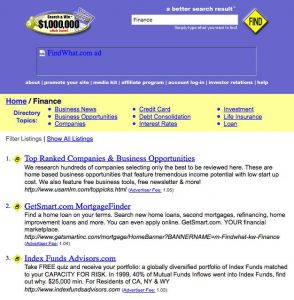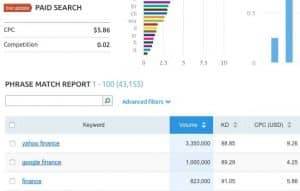Let’s take a look back, a throwback of sorts, back to the year 2000, when Pay Per Click was just getting started. This was uncharted waters, where companies were willing to test those uncharted waters of the PPC world. FindWhat was a popular search engine that didn’t offer any organic or “natural” search results. It was PPC only, and the higher you bid the better placement you got.
There was no algorithm. They didn’t crawl your PPC landing page to make sure that it was in line with the keywords you were bidding on.
Top placement in a category such as “Finance” was based on how much you were willing to bid per click.
Not only were the bid prices much lower than they are now (top bid was $1.05 per click for finance), whatever the advertiser bid per click was clearly shown in the search results!
Imagine if Google Adwords ads all included the bid prices of each click.
Then imagine if you only had to pay $1.05 for a top finance keyword!
Fast forward to 2016.
SEMrush.com reports that the word “finance” on Google AdWords is now $5.86 per click.
Courtney Jones from FindWhat.com – May 2019 Update
I recently heard from Courtney Jones, the Co-Founder and Chairman of FindWhat.com, who had the following to say:
“I am Courtney Jones and I was Co-Founder and Chairman of Findwhat.com. I haven’t seen the “search and win” screen shot for long time! That was one of my crazy marketing ideas.
To correct your article, we were a “real” search engine. We used Inktomi for backfill search as did Goto.com (Overture), Yahoo.com and others.
We also went to great lengths to verify keywords were related to the websites and categories they were bidding on. As we were the pioneers, along with Goto.com of paid search, we created tools for advertisers to bid on words, additionally, we had hundreds of customer service people, literally teaching advertisers how to bid and how to use our tools. We created relational databases, and taxonomies to make it easier for advertisers to figure out what words to bid on.
For sure it was the Stone Age.
Wallstreet thought it was ludicrous ( we were a public company ) to make a business out of advertisers bidding on keywords. They said it would never happen.
I met Sergey Brinn in Feb of 2000 at the Search Engine Strategy seminar in San Francisco, our booths were next to each other separated by a velvet rope.We were next to each other for two days. I asked him how he came up with the name, and what a Google was? He thought we were prostitutes because we were selling search to the highest bidder ( selling keywords, which is 99% of Google revenue today ) – it was only later when they ran out of money that they got into OUR business.
Also, because of your interest in search, I met with AltaVista, they turned us down saying search had to be “pure” and could not be manipulated by money. Also, Yahoo turned us down, then about a year later invited us back and told us if we paid them $10M they would put our search terms on the home page. We didn’t have $10M but Goto.com (Overture) did, and they paid $10M and the rest is history. Yahoo acquired Overture for $1.6 Billion.
An ironic twist to the story is that Goto.com had patents, as did we, and once acquired by Yahoo, Yahoo owned patents for paid search, and Google was violating their patents. But because Google had given Yahoo stock options, to replace Inktomi as backfill, their options were worth Billions at Googles IPO, Yahoo gave them a perpetual license for Paid Search. Terry Simel ( Yahoo CE) ) was very short sighted, and of course this lead to Yahoo’s demise and created the monopoly Google now enjoys.
Google bought one of our biggest affiliates Oingo, which it renamed Adsense.
And yes that’s how Google became an accidental multibillion dollar behemoth.
And oh, I almost forgot, little Findwhat.com grew to 130 million search a day, and became the first publicly traded internet company in the world to ever make a profit.
Paid search works. We knew it in 1999.”
It’s great to hear from some of the original owners and Co-Founders of websites that I used back in the 1990s, and to hear about how much has changed over the years.



